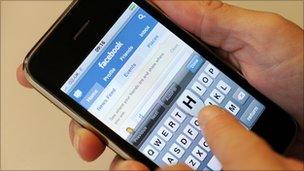Mobile firm Three backs all-you-can-eat data tariff
- Published

Mobile operator Three has scrapped its mobile data caps in an effort to gain more smartphone customers.
It said users needed all-you-can-eat data plans in order to make the most of their devices.
Demand for data is increasing as more people use their handsets to connect to the web as well as make voice calls.
Experts say it could force other operators to rethink data limits, introduced this year as networks struggled to cope with demand.
But it could put also put strain on Three's network.
"It is a bold move by Three and goes against the prevailing tide set by other networks who are trying to rein in data usage," said Ben Wood, an analyst with research firm CCS Insight.
"This is great news for prolific mobile data users but Three will need to be careful it does not end up attracting all the extreme users who have proved a real headache to rival networks with their excessive data usage."
Mobile operators, including Three, introduced data caps in the summer over fears that some users were consuming so much data it was putting unacceptable strain on networks.
Most operators offered limits of around 500 megabytes (MB) a month for basic phone tariffs.
Three had the highest data cap at 1 gigabyte (GB) per month.
"We were typically seeing people using around 400 to 500 megs at the moment but there is a large number who regularly go over the 1 gigabyte limit, enough to warrant us doing this," said a spokesman for Three.
Now users of its One Plan tariff can get 2,000 any-network voice minutes, 5,000 Three-to-Three minutes, 5,000 texts and any amount of data for £25 a month.
Such aggressive pricing is historically easier for Three, said Ian Fogg, an analyst with Forrester.
"Three is still one of the smaller operators and is working to acquire customers," he said.
Data notspots
Taking away data caps will make things easier for consumers, some of whom have fallen foul of data caps and ended up with huge bills.
"The latest smartphones stretch far beyond the capabilities of a traditional handset. All-you-can-eat tariffs will give users the freedom to explore these to the limit without the fear of running up extortionate bills," said Ernest Doku, a communications expert from comparison site uSwitch.
It will also lay down the gauntlet to other operators.
"It will be interesting to see how the competition will react. They will certainly not find it easy to handle the same influx of traffic as Three's data-savvy 3G infrastructure - nor will they be willing to give it away for free - making it difficult to see them follow suit with all-you-can-eat alternatives," said Mr Doku.
As mobile phones become the conduit to a world of apps, maps, social media updates, e-mail, music and video calls so there is increasing attention on how quickly the mobile network works.
The UK's 3G networks are notoriously patchy with mobile data speeds varying from provider to provider, town to town and even from street to street.
In an attempt to map the UK's data blackspots, comparison site Top10 is offering a web and iPhone app for customers to see and record their 3G speeds.
Initial data, based on 1,000 speed tests, shows that Vodafone offers the fastest connections, with an average of 3.04Mbps (megabits per second), compared to 2.61Mbps for 02 and 2.61Mb for Orange.
Three averaged 1.48Mbps and T-Mobile came bottom of the league table with an average of 1.40Mbps.
Mr Fogg predicts that operators could start offering tariffs based on speeds, with higher data rates being made available to those on premium packages.
- Published17 November 2010
- Published6 September 2010